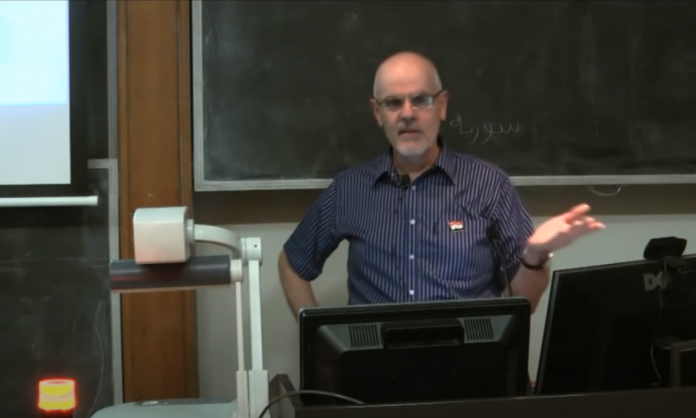A recent Federal Court decision to uphold the dismissal of University of Sydney senior lecturer Tim Anderson is a dangerous attack on free speech on university campuses as well as the Palestine solidarity movement. The court’s decision sets a dangerous precedent for academics wishing to publicly express views at odds with those of university management. And while Palestine supporters are no strangers to the punitive actions of University of Sydney management, having faced its internal courts and witch-hunts before, Anderson’s sacking marks a new escalation of this repression.
Management’s campaign against Anderson stretches back to at least 2017, when he was warned that his social media accounts were under surveillance because of his political opinions, most notably his support for the struggle of the Palestinian people. An outspoken critic of Zionism, Anderson was eventually ousted from his position in February 2019 after the university conducted an internal investigation into alleged misconduct. The alleged misconduct involved the legitimate comparison of the ethnic cleansing of Palestine to Nazi crimes against Jewish people, which according to deputy vice-chancellor Stephen Garton was “disrespectful and offensive”, and “contrary to the university’s behavioural expectations”.
All this from the institution which rewarded former Prime Minister John Howard, war criminal and leading conspirator in the invasion and occupation of Iraq, with an honorary doctorate in 2016. At the ceremony to bestow the award, university Chancellor Belinda Hutchinson, who is also the Australian chairperson of weapons manufacturer Thales, commended Howard for his “strong diplomatic skill”. Presumably the University of Sydney thinks that imperial conquest is more in line with its “behavioural expectations” than siding with the oppressed.
Reprisals against supporters of the Palestinians, and attempts to chastise and slander the left for defending Muslims and other oppressed groups, have become a favourite tactic of the establishment in recent years. Whether it’s the witch-hunt against former British Labour Party leader Jeremy Corbyn, or French President Emmanuel Macron’s hysterical campaign against “Islamo-leftism”, these attacks have become a convenient means to attack, slander and discredit critics of the status quo. Basic anti-imperialist and anti-racist positions are belligerently cast as bigotry, while cynical right-wingers present themselves as champions of social justice and democratic values. In this way, it is the right-wing that successfully “cancel” public figures because of views they disagree with, despite their incessant whinging about the supposedly rampant nature of “cancel culture” on university campuses.
Anderson’s case represents a major blow against free speech, yet the anti-cancel culture right seem unperturbed. On paper, the University of Sydney has some of the most stringent measures to protect free speech of any university in the country. A point of contention during the 2013 strike campaign, the enterprise agreement includes an intellectual freedom clause that ostensibly exists to allow academics to work without fear of recriminations. Likewise, its free speech charter adopted at the beginning of 2020 actually states that the university does not have a “duty to protect any person from feeling offended or shocked or insulted”. Management’s behaviour and the recent ruling annul any effective meaning for the intellectual freedom clause, and for freedom of speech on campus in general.
Federal Court judge Thomas Thawley agreed with university management’s claims that the enterprise agreement “does not create a legally enforceable right to intellectual freedom”. Thawley ruled that the university’s managerial prerogative overrides any implied right to academic freedom in the enterprise agreement, and that its clauses do not “immunise” them from the internal misconduct process. Further, the court stipulated that university academics have “to obey the lawful directions of the employer” in regards to not only teaching material, but also personal opinions expressed on social media.
Anderson is not an isolated case. The recent revoking of Dr Rick Kuhn’s honorary status at the Australian National University, widely seen as an act of retaliation against his involvement in the campaign to stop pandemic-related wage cuts and restructures in the higher education sector, is another example of university management taking punitive measures against outspoken academics.
The court upholding the University of Sydney management’s actions gives license to administrations everywhere to crack down on dissident voices and others unwilling to bend to draconian standards of management-dictated “respectful behaviour”. What respect are vicious vice-chancellors, who dedicate their time to sacking staff, slashing courses and abolishing entire disciplines, entitled to?
Palestine solidarity has long been and will remain a target of right-wing cancellation campaigns. The Anderson case perfectly embodies the convergence of the vicious anti-Palestine crusade and a general offensive against the left. Refusing to cede ground to either of these attacks is the best basis to push back against both.








